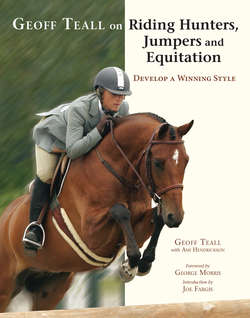Читать книгу Geoff Teall on Riding Hunters, Jumpers and Equitation - Geoff Teall - Страница 32
На сайте Литреса книга снята с продажи.
Make a Difference for the Better
ОглавлениеAll of your training should make a difference for the better. The most consistent practice schedule won’t do any good if your riding makes your horse stiff, sore, and uncomfortable.
Your goal when riding is to teach your horse to be relaxed and supple. Then his job gets easier. He can become more and more responsive to you.
When the horse understands what you want from him, there is no need to drill endlessly. Riding well is all about subtracting the unnecessary parts and focusing on what is needed.
Consider your schooling time. If you generally ride for an hour, analyze what you want to accomplish in that time. Then, see if you can get it done just as effectively in forty-five minutes. Once that is possible, work at decreasing your schooling time to just half an hour. Make every minute count—then stop.
Beware of saying, “I’ll do a little bit more just in case.” That means you are making the horse do more work because of your uncertainty. The overall principle of good horsemanship, and the art of riding, is to ride with as little exertion as possible.
As a general rule, I try to get my riders and students to do the least amount of schooling necessary. I like to put my horses to bed the night before the show ready to go. Then, I only need to do some quick longeing or flatwork in the morning to fine tune them before I send them into the show ring.
When schooling, continually remind yourself that less is more. If you can get a perfect jump after ten schooling jumps, try to do it in nine. Then do it in seven. Then four. Look for ways to reward yourself and your horse for mastering something, rather than repeating it until it becomes monotonous, mechanical, and dull.
